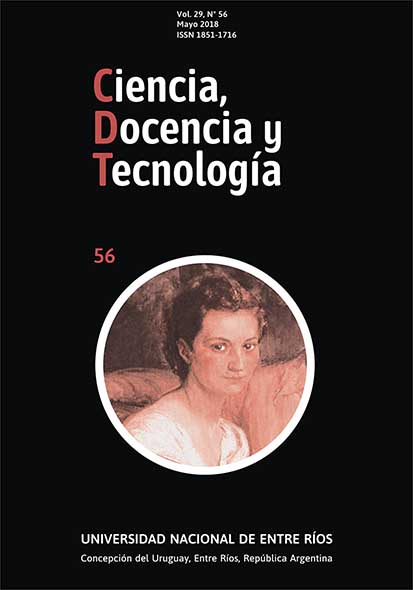Abstract
In this paper, we analyze the actions of socio-technical resistance developed by different social actors as forms of resignification of the processes of innovation and technological change.
In order to realize this goal, we propose, firstly, a critical analysis of the approaches on resistance to the technology and the introduction of some conceptual tools of socio-technical analysis. Next, an analysis of two case studies, which allow us to identify at least two forms of socio-technical resistance: a) by re-signification of technologies and b) through the construction of alternative technological systems. Finally, we propose integrative conclusions that allow us to construct a conceptualization of "socio-technical resistance".
References
BAUER, M. (1995).Resistance to new technology and its effects on nuclear power.Information technology and biotechnology (pp. 1-41).En BAUER, M. Resistance to New Technology. Nuclear power, information technology and biotechnology, Cambridge: Cambridge University Press.
BIJKER, W. (1995).Of Bicycles, Bakelites, and Bulbs.Toward a Theory of Sociotechnical Change.Cambridge: The MIT Press.
BUSTOS, R. (2003). La dimensión política de la identidad y los conflictos sociales. El movimiento social indígena Huarpe de Mendoza, en: Revista Confluencia 1 (1): 185-194.
CID AGUAYO, B. (2014). Movimientos agroecológico y neo campesino: respuestas postmodernas a la clásica cuestión agraria, en: Agroalimentaria 20 (39): 65-78.
CID AGUAYO, B.; HINRICHS, J. (2015). Curadoras de semillas: entre empoderamiento y esencialismo estratégico, en: Revista Estudos Feministas 23 (2): 347-370.
CRUMP, A. (1993).Dictionary of Environment and Development. Cambridge: The MIT Press.
GARRIDO, S.; LALOUF, A. (2012).The socio-technical alliance. Bringing new tools to the design of policies aimed to promote social inclusion, en:Review of Policy Research 29 (6): 733-751.
GARRIDO, S.; LALOUF, A. (2016). Desarrollar energías renovables / renovar estrategias de desarrollo. Elementos para la construcción de nuevas políticas de intervención orientadas a dinámicas de inclusión social y desarrollo sustentable (pp. 121-173). En THOMAS, H.; SANTOS, G. (Coords.): Tecnologías para incluir. Ocho análisis socio-técnicos orientados al diseño estratégico de artefactos y normativas, Carapachay: Lenguaje Claro.
GARRIDO, S.; LALOUF, A.; THOMAS, H. (2011). Resistencia y adecuación socio-técnica en los procesos de implementación de tecnologías. Los dispositivos solares en el secano de Lavalle, en:Avances en Energías Renovables y Medio Ambiente 15: 1201-1210.
GRAMSCI, A. (1987): Cuadernos de la Cárcel.México: Editorial Era.
HOBSBAWM, E.; RUDÉ, G. (2009). Revolución industrial y revuelta agraria: El capitán Swing. Madrid: Siglo XXI.
JOFFILY, G. (1977). O Quebra-Quilo – A Revolta dos matutos contra os doutores –
Brasília: Thesaurus.
KLINE, R. (2003). Resisting consumer technology in rural America: The telephone and electrification (pp. 51-79). EnOUDSHOORN, N.; PINCH, T. (Eds.), How Users Matter. The Co-construction of Users and Technology,Cambridge: MIT Press.
NACIONES UNIDAS (2014). Ciencia, tecnología e innovación para la agenda de desarrollo después de 2015. http://unctad.org/meetings/es/SessionalDocuments/ecn162014d2_es.pdf.
OUDSHOORN, N.; PINCH, T. (2003). Introduction: How Users and Non-Users Matter. En OUDSHOORN, N.; PINCH, T. (Eds.), How Users Matter. The Co-construction of Users and Technology, Cambridge: MIT Press.
PEREZ, I. (2005). Curadoras de semillas: contribución del conocimiento tradicional al manejo descentralizado de la biodiversidad.Serie de Publicaciones CETSUR, no. 5.
PINCH, T.; BIJKER, W. (1987). The Social Construction of Facts and Artifacts: Or How the Sociology of Science and The Sociology of Technology Might Benefit Each Other (pp. 17-50), en BIJKER, W; HUGHES, T.; PINCH, T. (Eds.): The Social Construction of Technological Systems – New directions in the sociology and history of technology, Cambridge: MIT Press.
RAM, S.; SHETH, J. (1989). Consumer Resistance to Innovations: The Marketing Problem and its Solutions, En: Journal of consumer marketing 6 (2): 5-14.
RICHARDSON, K. (2008). Quebra-Quilos and Peasant Resistance: Peasants, Religion, and Politics in Nineteenth-Century Brazil, disertación doctoral, Texas Tech University.
ROSEBERRY, W. (2002).Hegemonía y lenguaje contencioso (pp. 213-226). En JOSEPH, G.; NUGENT, D. (Comp.): Aspectos cotidianos de la formación del estado,México D.F.: Ediciones Era.
SCOTT, J. (1985). Weapons of the weak: everyday forms of resistance. New Haven y Londres: Yale University Press.
SECRETO, M.V. (2004). Sem Medida: Revoltas no Nordeste Contra as MediçõesImperiais, Ponencia presentada en el Segundo Congreso Nacional de Historia Económica “La Historia Económica hoy, entre la Economía y la Historia”, UNAM.
SHETHM J. (1981). Psychology of Innovation Resistance: The Less Developed Concept (LDC) in Diffusion Research. En:Research in Marketing: 273-282.
SOTO, D.; MANCILLA IVACA, N.; VALENZUENLA SEPÙLVEDA, V. (2014). Trafkintu: curadoras de semillas defendiendo la soberanía alimentaria. En: Letras Verdes. Revista Latinoamericana de Estudios Socio-ambientales 16: 76-93.
THERBORN, G. (1987). La ideología del poder y el poder de la ideología. Madrid: Siglo XXI.
THOMAS, H. (2008). Estructuras cerradas vs. Procesos dinámicos: trayectorias y estilos de innovación y cambio tecnológico (pp. 217-262). En THOMAS, H; BUCH, A. (Eds.): Actos, actores y artefactos. Sociología de la Tecnología, Bernal: Editorial UNQ.
THOMAS, H. (2012). Sistemas Tecnológicos Sociales y Ciudadanía Socio-Técnica. Innovación, Desarrollo, Democracia (PP. 65-86). En: TULA MOLINA, F.; GIULIANO, G. (Eds.):Culturas Científicas y Alternativas Tecnológicas, Buenos Aires: MINCyT.
VALDERRAMA, A.; JIMENEZ, J. (2005). Tecnología, Cultura y Resistencia. En: Revista de Estudios Sociales 22: 99-103.
VALDERRAMA, A.; JIMENEZ, J. (2008). Desarrollos tecnológicos en Colombia: superando categorías de oposición. En: REDES. Revista de estudios sociales de la ciencia y la tecnología 14 (27): 97-115.
WINNER, L. (2016). Decadencia y caída del tecnotriunfalismo. En: REDES. Revista de estudios sociales de la ciencia y la tecnología 22 (43):127-142.

This work is licensed under a Creative Commons Attribution-NonCommercial-ShareAlike 4.0 International License.
Copyright (c) 2018 Santiago Manuel Garrido, Hernán Eduardo Thomas, Lucas Dardo Becerra

